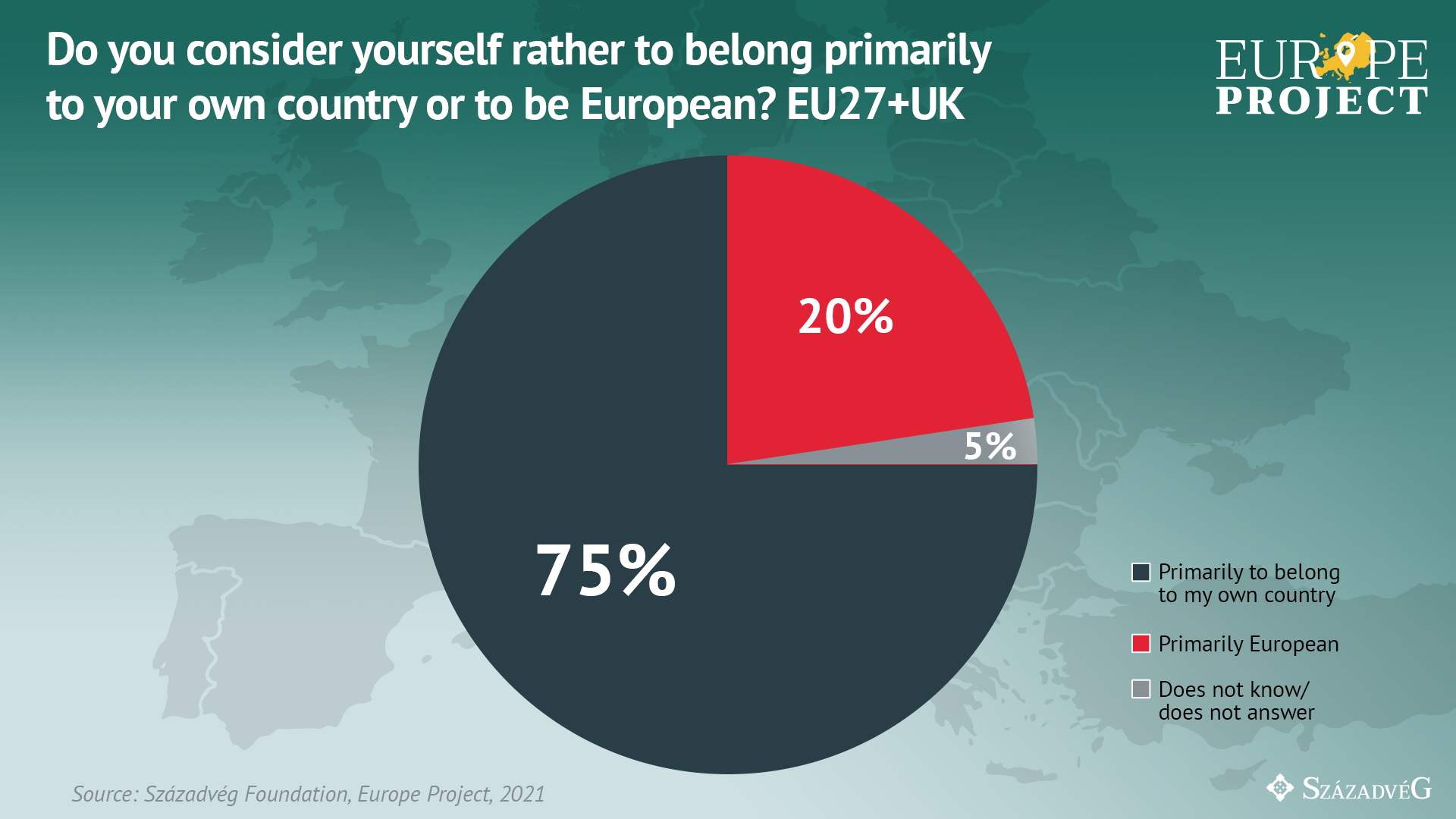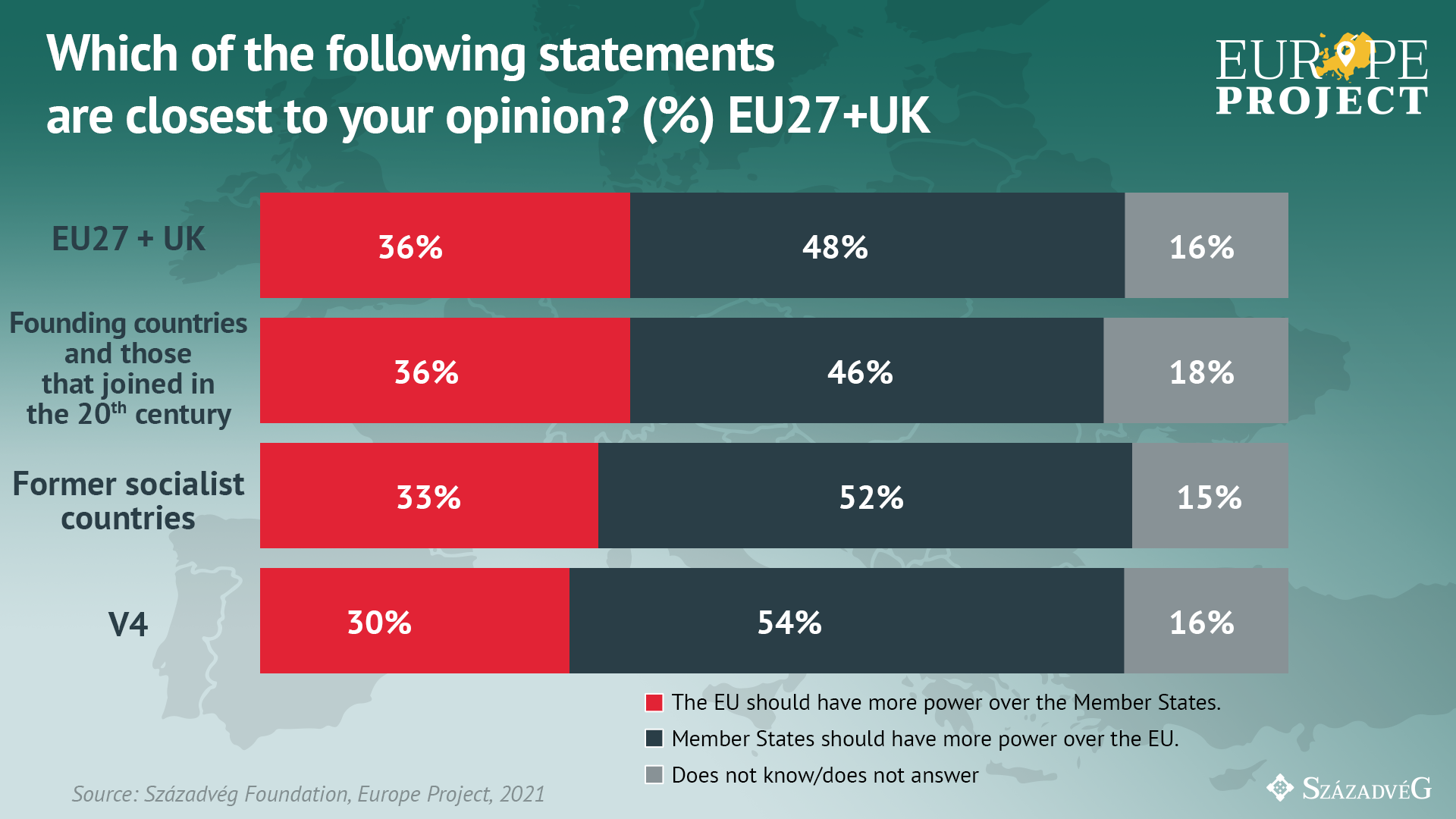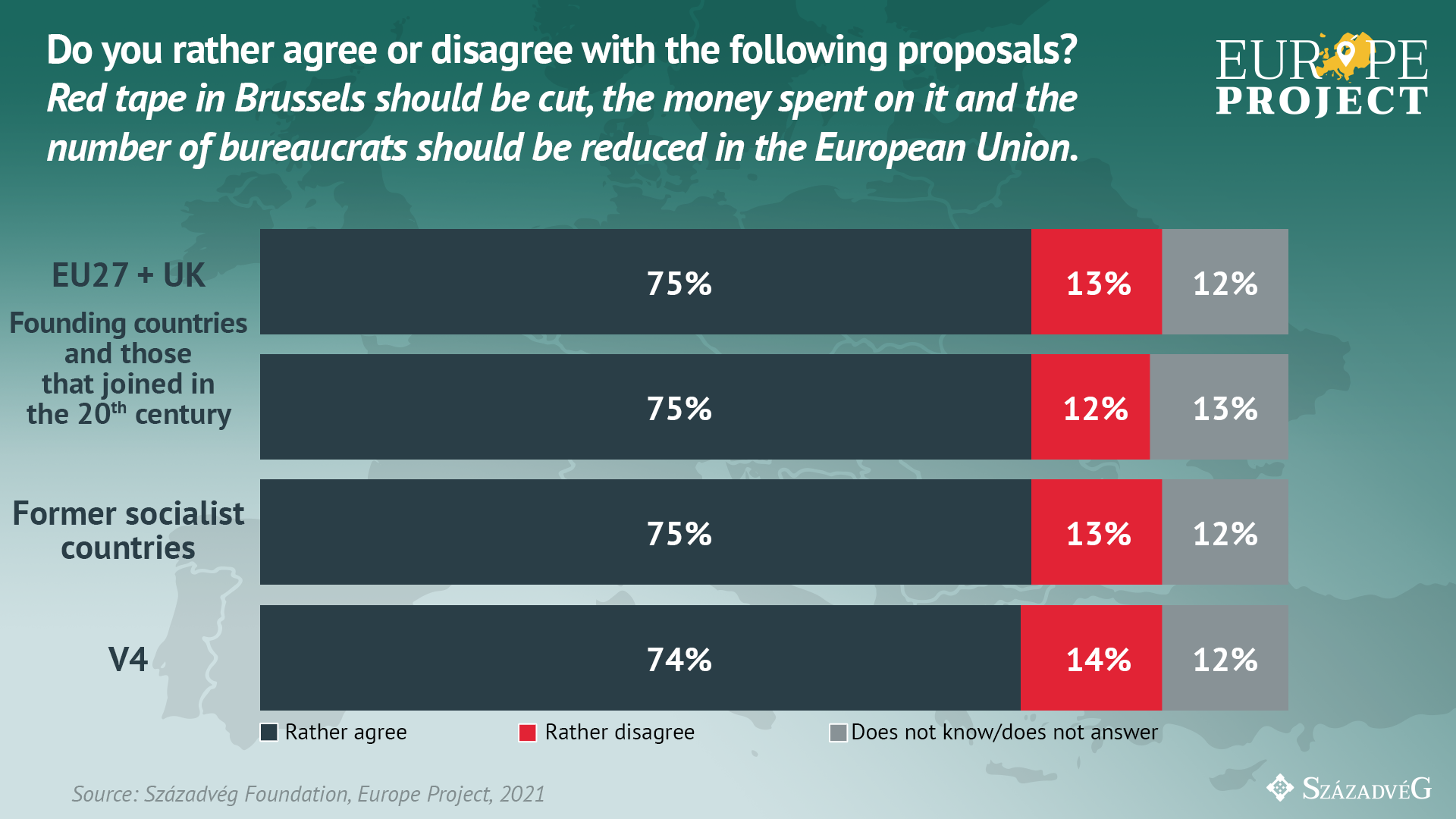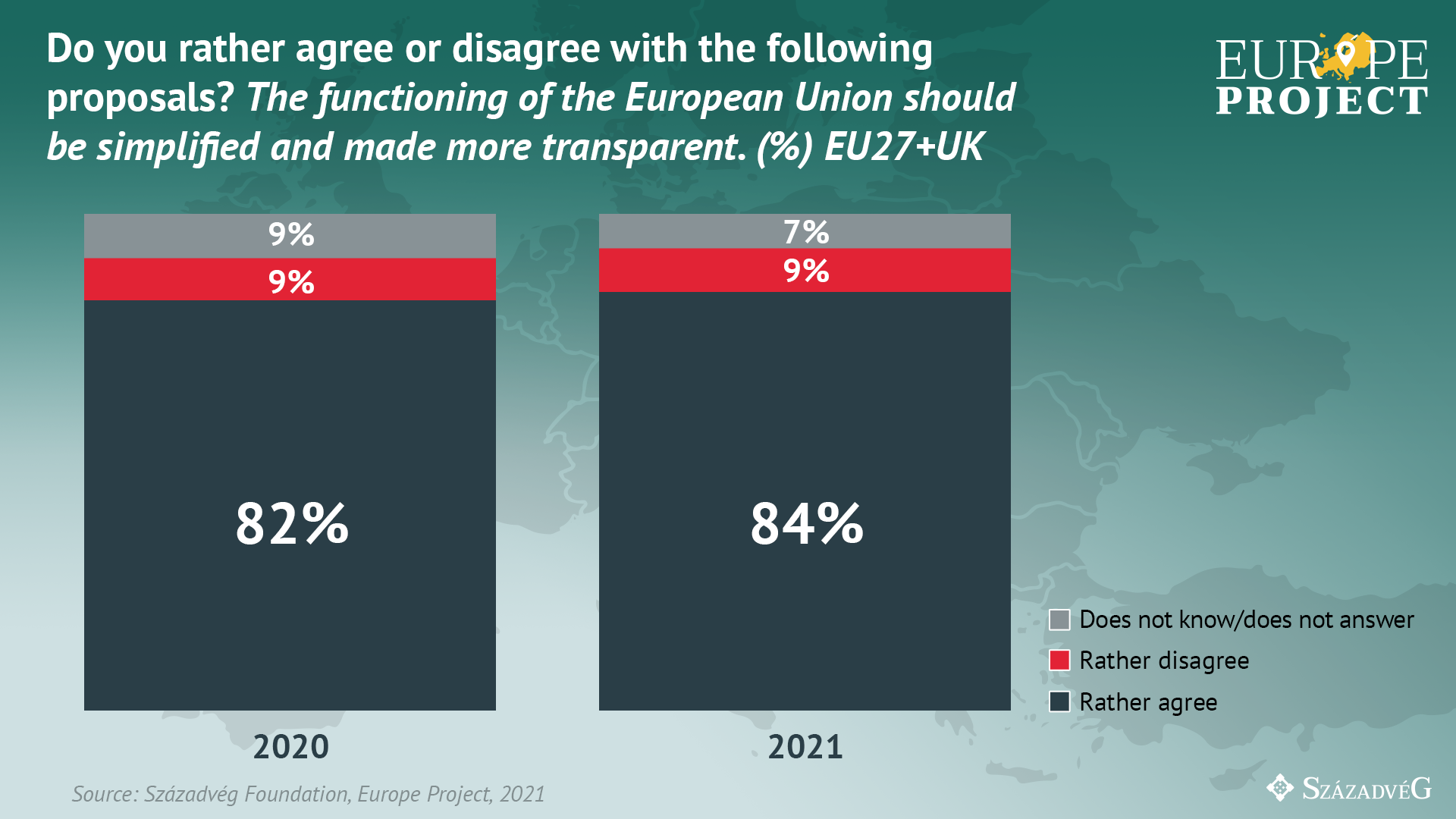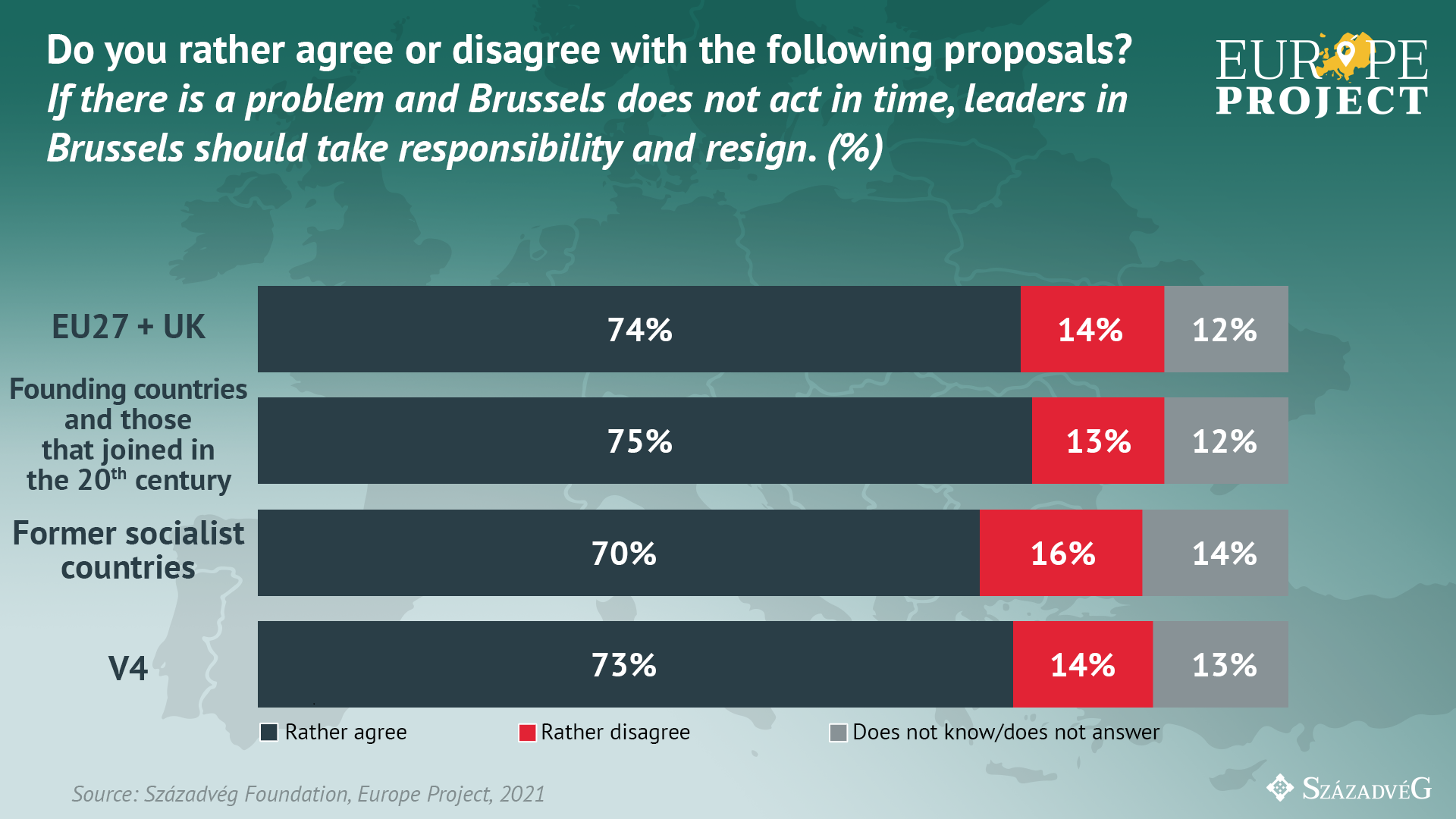The importance of nation-state identity and sovereignty in Europe remains undiminished
Conflicting views on the future direction and intensity of integration, in other words, the debates over the desired balance between the powers of the bodies in Brussels and the room for manoeuvre of nation states have been a key element of the European political agenda for decades. It is important to note that the most important precondition for the creation of a “United States of Europe”, aiming at the implementation of a much stronger integration than today and greater centralised decision-making powers for Brussels, i.e.,
a sense of European identity that undermines the importance of national identity has not yet developed.
The Europe Project survey shows that three-quarters (75 percent) of EU and UK respondents consider themselves to belong primarily to their own country, while, according to their self-classification, the proportion of those who consider themselves to be European is 20 percent. National identity is considered to have the highest importance by Finnish, Hungarian and Portuguese respondents (86 percent for each), while the lowest importance was attached by respondents in Luxembourg (57 percent), Poland (63 percent), and Germany (66 percent). Interestingly, the proportion of those who define themselves primarily as European has not changed significantly over the years among EU and British citizens (it did not exceed 20 percent in any of the years between 2019 and 2021). Furthermore,
respondents who consider themselves to belong primarily to their own country are a majority in all European countries surveyed.
In this context, it is shown that,
as in previous years, Europeans still do not support the increase of the powers of the bodies in Brussels at the expense of Member States.
. The survey shows that 48 percent of EU and British respondents, 52 percent of former socialist countries’ citizens, and 54 percent of V4 respondents would give Member States more power over the European Union. The proportion of those who would approve the concentration of power in Brussels over nation-states is 36 percent for EU and British citizens, compared with 33 and 30 percent for the former socialist bloc and the V4 countries, respectively. Examined the question by country, it is shown that mostly Slovakians (68 percent), Czechs (67 percent), Finnish (66 percent), and Hungarians and Brits (60 percent each) would provide more power for Member States over the European Union. Of the 30 countries surveyed, the proportion of those who would delegate more power to Brussels over the Member States exceeded 50 percent only in two countries: Slovenia (56 percent) and Spain (54 percent).
Clear demands across Europe: fewer Eurocrats but more effective advocacy in Brussels
The shortcomings of the European Union’s operational structure and the critical points in Brussels’ policy (including slow and ineffective measures in crisis situations) have come to the fore on several occasions in recent years. Based on the research data of the Europe Project, it can be stated that
the vast majority of Europeans want a more efficient European Union with less bureaucracy and fewer administrative barriers.
The survey highlights that 74 percent of European citizens in 2020, and 75 percent in 2021 agreed that red tape in Brussels should be cut, the money spent on it and the number of bureaucrats should be reduced in the European Union. No significant differences can be seen in the assessment of the issue between certain groups of countries: the proportion of respondents in the founding countries and those that joined in the 20th century, as well as in former socialist countries, who would approve of cutting red tape in Brussels is 75 percent each, and it is 74 percent in the V4 countries. It is meaningful that
in all European countries surveyed, the majority agree with cutting red tape in the European Union,
with the highest proportion in Portugal (86 percent) and the lowest in Luxembourg (64 percent).
It is easy to see that the over-bureaucratic operation of the EU can have several negative consequences, of which the deterioration of the quality of electoral representation and the distancing of decision-makers in Brussels from the everyday problems of European citizens should be emphasised. According to the survey, 51 percent of EU and British citizens, half of those surveyed in the former socialist countries (50 percent), and 48 percent of V4 respondents considered the statement that their interests are represented in Brussels to be untrue. It is worrisome that
in 2021, 22 European countries had a higher proportion of respondents who believed that their interests and views are not adequately represented in Brussels compared to those who were satisfied with the representation of their interest in the EU.
Regarding the representation of their views and interests in Brussels, respondents in Malta (29 percent), Luxembourg (31 percent) and Ireland (36 percent) were least dissatisfied, while respondents in the Czech Republic (63 percent) and Bulgaria (52 percent) were the most dissatisfied.
The majority of Hungarian respondents (52 percent) also believed that their interests are not adequately represented in Brussels.
A more transparent and accountable European Union is needed
Transparency, and political or legal responsibility for erroneous decisions or the lack of measures, is an essential element of any democratic system, and it is even more important in a cooperation structure such as the European Union. The bodies in Brussels have solely the type and scope of powers that have been transferred to these bodies by the Member States in the Treaties. Research results show that there is a strong demand by European public opinion for managing these rights in a transparent, predictable, and accountable way in Brussels. It is noteworthy that,
compared to 2020, the proportion of European respondents who thought that the functioning of the European Union should be simplified and made more transparent increased from 82 percent to 84 percent in 2021.
A consensus is being outlined in the European Community on this demand, as there are no significant differences in the assessment of the issue for either the groups of countries or the individual countries surveyed. Eighty-four percent of respondents in the founding countries and those that joined in the 20th century, 82 percent of citizens in the former socialist bloc, and 81 percent of respondents in the V4 cooperation approve of making operations in Brussels simpler and more transparent.
The picture is further nuanced by the fact that the proportion of those who believe that if there is a problem and Brussels does not act in time, leaders in Brussels should take responsibility for the consequences and resign from office, increased from 71 percent in 2020 to 74 percent in 2021. Examined the issue by groups of countries, it is shown that 75 percent of citizens in the founding countries and those that joined in the 20th century, 70 percent of respondents in former socialist countries, and 73 percent of respondents in the V4 countries consider this responsibility to be justified. It is important to point out that
in 29 of the 30 European countries surveyed, the majority of citizens would expect the leaders in Brussels to resign if they do not act in time in a crisis situation.
The latter expectation was expressed in the highest proportion by Croatian (90 percent), Hungarian (85 percent), and Spanish (84 percent) respondents.
In the first half of 2016, the Századvég Foundation conducted a public opinion poll survey covering all 28 European Union Member States, with the aim to analyse the opinions of EU citizens regarding the issues that most affect the future of the EU. In a unique way, Project28 conducted the widest possible survey of 1,000, that is a total of 28,000 randomly selected adults in each country. Gaining an understanding of society’s sense of prosperity and mapping the population’s attitudes towards the performance of the European Union, the migration crisis and the increasing terrorism were among the most important goals of the analysis. The Századvég Foundation, on behalf of the Hungarian Government, conducted the research again in 2017, 2018 and 2019, which continued to reflect on the topics that most determined the European political and social discourse.
In 2021, the aim of the survey is again to map the population’s attitude towards the most important public issues affecting our continent. In addition to society’s sense of prosperity, the performance of the European Union and the attitudes towards the migration crisis, in line with the latest challenges affecting Europe, the dominant theme of this year’s poll is the coronavirus pandemic, climate change, energy supply and family policy. In addition to the European Union Member States, the 2021 research covered the United Kingdom, Norway, and Switzerland, interviewing a total of 30,000 randomly selected adults using the CATI method between 1 and 15 September.
